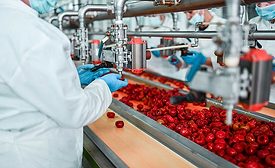Home » Keywords: » antimicrobial
Items Tagged with 'antimicrobial'
ARTICLES
Multiple measures are needed to reduce the risk of listeriosis associated with RTE foods
Read More
Balancing Chemical and Biological Hazards With the Help of APAs to Safeguard Food Quality
Antimicrobial processing aids are preventive control interventions that are capable of reducing bacteria from the surfaces of foods at multiple steps throughout the supply chain
July 2, 2024
Innovation at the Intersection of Food Packaging and Food Safety
Several food packaging options have emerged that directly contribute to producing a high-quality and safe food product
February 6, 2023
Never miss the latest news and trends driving the food safety industry
eNewsletter | Website | eMagazine
JOIN TODAY!Copyright ©2025. All Rights Reserved BNP Media.
Design, CMS, Hosting & Web Development :: ePublishing










